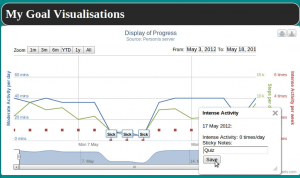Personal Informatics in Practice: Enabling People to Capture, Manage and Control Information for Lifelong Goals
Ian Li
May 22, 2012
 Debjanee Barua is PhD student of Computer Science in University of Sydney. She works in CHAI research group. She designs and develops software framework and user interfaces for Personal Informatics.
Debjanee Barua is PhD student of Computer Science in University of Sydney. She works in CHAI research group. She designs and develops software framework and user interfaces for Personal Informatics.
 Judy Kay is Professor of Computer Science at the University of Sydney. Her research is in technologies for human computer interaction, supporting personalisation, pervasive and mobile interaction.
Judy Kay is Professor of Computer Science at the University of Sydney. Her research is in technologies for human computer interaction, supporting personalisation, pervasive and mobile interaction.
 Bob Kummerfeld is an Associate Professor of Computer Science in the School of Information Technologies at the University of Sydney. Bob carries out research into system support for pervasive user models.
Bob Kummerfeld is an Associate Professor of Computer Science in the School of Information Technologies at the University of Sydney. Bob carries out research into system support for pervasive user models.
People’s long term, important goals are drivers for using personal informatics tools. For example, if a person’s goal is achieve and maintain good health, this is a driver to capture data such as blood pressure, exercise, activity, sleep and food eaten. Personal informatics tools aim to make it easy for people to capture such information and so that it is available for self-monitoring, so people can see how they are progressing towards their goals. It can also help people decide how to alter their behaviour and then to see if this helps them achieve their goals.
Our research aims to create a personal informatics framework for lifelong goals, by enabling people to have a new form of flexibility and control to:
- set relevant and realistic personal goals;
- link these flexibly to tools that capture relevant personal data;
- monitor their progress towards goals;
- and manage the data over the long term (update, share, delete, archive).
As one might expect, given the importance of goal setting and tracking, there are many goal setting systems, such as HealthMonth, GoalsOnTrack, stickK. While these provide a variety of valuable support for goal setting, they lack support for 2 and 4 above. We aim to address the broad challenges of enabling people to flexibly manage and control their data associated with their long term important goals.
User control over personal data during goal setting:
To help people think about the personal data that will be useful for achieving their goals, we are exploring a rich representation of goals. This should enable people to think more effectively about their goals and the kinds of personal data that could be useful. We draw on theories such as Goal-setting Theory and Social Cognitive Theory which point to the importance of aspects such as specificity, importance and difficulty of the goal, deadlines and feedback about the goal, commitment and self efficacy about being about to complete the goal. So we aim to help people think about these aspects. We explain each of these at the goal setting interface. We suggest personalised default values, and explain the reasons for those recommendations, and allow users to set their own values if they wish.
User control over personal data while linking devices to goals:
Social cognitive theory also indicates that if a person is aware of their potential resources (e.g. monitoring tools, social support) towards achieving goals, they gain insight about their own capabilities. In our system, for example, if a person acquires a step counter, they are advised to set an initial goal of using it to get a baseline, by tracking daily steps walked each day over a week. Suppose this indicates they walk an average 5,000 steps a day. Our system recommends an initial goal of 6,000 steps a day for the next week, explaining that while it is well below the recommended 10,000, it is more likely to be attainable from this person’s baseline. Thus our framework both recommends goals that are likely to be achievable and explains the reasons for the recommendation.
Personal informatics now has many different tools for monitoring health and activity. Users can choose different tools for monitoring different goals. This can create a problem which we call ‘scattered subgoals’. For example, maintaining wellbeing includes several subgoals such as “Walking 10000 steps a day”, “Do at least 30 minutes moderate activity per day”, or “Avoid more than 30 minutes of sitting in front of computer”. Users might use step counters such as Fitbit for monitoring a step goal, mobile applications for logging minutes of activity, or notifiers to remind them if they are in static posture for more than 30 minutes. In most cases, they have to visit different web sites to monitor different goals. This makes it hard to monitor goals. Available goal setting systems have not addressed this issue so far.
Our vision is to make it much more easier for people to monitor their diverse goals because our system enables them to aggregate their personal data for all their goals, extracting it from different systems and keeping it in a single store that the individual controls. Since more and more APIs are becoming available for developing mashups for personal health informatics, we can readily extract such information. The challenge still remains to ensure the person can control this aggregation and then manage the information effectively so that it serves their goals.
User access to aggregated information for goal monitoring:
An important part of our work is to enable people to see several goals together and to log salient notes about them. The example in Figure 1 shows a hypothetical user monitoring three goals:
walking 10k steps/day goal (green graph),
having 5 periods of intense activity per week (red dots)
at least 60 minutes moderate activity daily (blue graph).

Figure 1: Visualisation for goal monitoring
The figure illustrates the user noting a quiz that interfered with achieving the goals (just as they noted that they were sick in the previous week). Theories of metacognition indicate the importance of enabling people to for log such salient life events to explain the progress achieved and make sense of long term information and trends.
User control over managing personal data:
Finally, existing systems lack support for people to manage the lifelong personal information. We have identified several important levels of control:
determining which information can be shared with others;
easy ways to remove information, for example when sensor data is wrong (such as when they allowed someone else to use their step counter);
transforming the information into compacted forms, for example, reducing fine-grained sensor data into higher level information about goals, so reducing the amount of information kept, reducing the risk to privacy it creates.
To achieve user control over goal related data, we will design and evaluate interfaces for managing goals and reflection over long term by defining goals; monitoring the social and cognitive information associated with each goal; and reviewing goals. These will enable users to connect sensors and choose the type and frequency of feedback, including e-mail, tweets, desktop notification and ambient displays. The driving design goal of our framework is to ensure user control of personal data.



